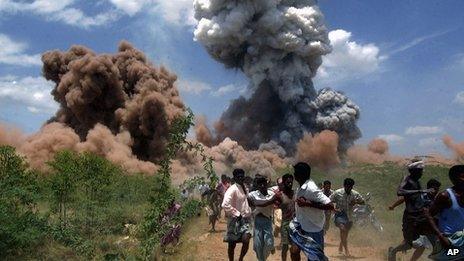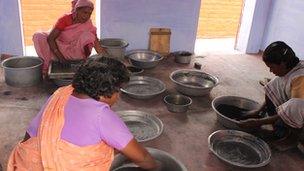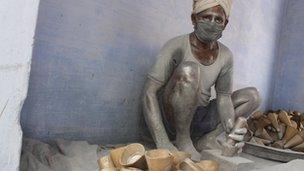Sivakasi: India's dangerous fireworks capital
- Published

The 5 September fire in a Sivakasi fireworks factory was the worst in recent memory
Sivakasi town in the southern Indian state of Tamil Nadu is known as the country's fireworks capital. But frequent accidents have blotted the town's image, reports the BBC Hindi's Vineet Khare.
The 5 September blaze at a fireworks factory that claimed 38 lives was the worst in recent memory.
In some of the biggest factory fires, about 40 people died in 2009, 30 in 2001 and more than 60 in 1991. The list of casualties in smaller mishaps is much longer.
But more than 700,000 workers of Sivakasi have no other option but to depend on one of the most hazardous industries for their livelihood.
About 20-25 workers die each year in fire accidents in this industry which boasts of an estimated annual turnover of more than $365m (£225m).
India is the second biggest producer of fireworks after China and, manufacturers say, almost all of it is for domestic consumption.
Sivakasi - also known for its matchbox and printing industries - contributes more than 90% to India's overall fireworks production.
Painful scars
But those who work in the industry carry painful scars - a broken leg or skull, or a hand burnt by explosives, and many here complain of chronic respiratory problems.

The fireworks industry is blamed for poor safety standards and paying a pittance to workers
"In the last 12 months, before this accident, 22 workers lost their lives and 50 were injured," says Dr M Kathiresan, chief medical officer at the local government hospital.
The hospital has a shortage of staff and equipment and has no supply of morphine, the standard pain relief drug for burn victims.
After a brief shutdown following the 5 September accident, the factories have reopened and the workers are back.
"We are scared, but what else do we do," said Pummeraj, who is recuperating at home with extensive burns on his body.
The industry is criticised for observing poor safety standards and paying as low as $3 (£1.85) a day to workers.
The industry rejects the charges, saying it contributes by running schools for the workers' children and providing employment.
The inside story
In the intense heat, when a lack of breeze meant it felt much hotter than the 36C (96F), we reached the Vinayaga Crackers' factory.
The company, with "interests in granite, agriculture and other items", is the first to own an overseas fireworks warehouse in Durban, its brochure said.
Behind its iron gates lay a vast expanse of open space dotted with match-box like rooms.
Inside, among heaps of material, were batches of men and women - all without gloves or masks, sitting on the floor, their hands moving deftly, eyes focussed.
It seemed like an open science lab with an array of dangerous chemicals and explosives.
These chemicals affect the lungs and masks must be worn, said a factory official, adding that some workers do suffer from tuberculosis.
I met Bhawani, a middle-aged woman, who greeted me with a cautious smile.
Her eyes were fixed on a silvery round box, packed with vertically placed rolled-up paper tubes filled with a mixture of aluminium powder, potassium nitrate and sulphur, and tipped with mud.
In an adjacent room, three women sifted through gunpowder, while others were inserting fuses.
"Why aren't they wearing gloves?" I ask the factory's technical head Ravi Kumar.
"You cannot work fast if you do," he replies.
Another worker Narayanswamy's head was covered with a plastic sheet while his bare hands dipped in a silvery mixture of chemicals and his body and clothes carried the shine of aluminium powder.
"When we started our factory in 1982, my brother and I mixed chemicals and filled them in tubes, but we never faced any health problems," said company director P Ganesan, as he dismissed all talk of danger.
But a senior officer with the federal security watchdog, the Petroleum and Explosives Safety Organisation (PESO), told the BBC that "even humidity level changes can set off a chemical decomposition and a volatile reaction".
'Mistakes'
A license for a fireworks factory comes through only after clearances from the local police, pollution, health and other departments, but a lack of coordination and the absence of routine official checks mean many factories do not follow safety norms.

Employees work in hazardous conditions and many complain of various health problems
Workers are expected to learn intricate procedures like mixing chemicals and explosives on the job.
A PESO official said their brand new training centre has been lying unused for a year.
"Four officers are expected to monitor over 1,000 factories and hundreds of other units. How do you do that?" he asked.
And often, government officials assigned to monitor the factories themselves lack the technical qualification for the job.
Two years ago, four policemen and four government officials were killed during an inspection.
"No owner likes an accident for which he will be prosecuted, but one man's mistake means trouble for 100 others," said V Ramamoorthy, director of Jubilant Crackers factory, who blamed the frequent accidents on the management and "mistakes" by workers.
- Published6 September 2012
- Published5 September 2012
- Published5 September 2012